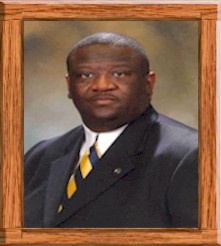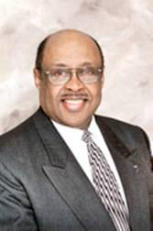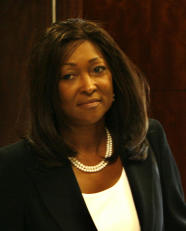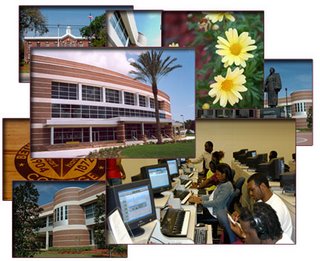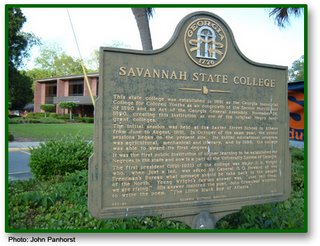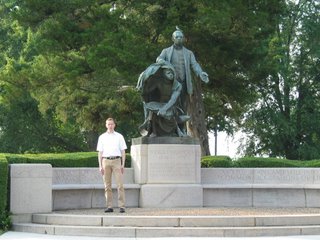
At the beginning of the 20th century, George Washington Carver and other researchers and educators at Tuskegee University helped revolutionize Southern agriculture by urging farmers to plant alternative crops such as peanuts and sweet potatoes in fields depleted by decades of cotton farming.
With alumni returning this weekend to celebrate Tuskegee's 125th anniversary, the school's researchers are developing methods to enable astronauts to grow peanuts and sweet potatoes on space missions.
Home of the Tuskegee Airmen, the first black pilots trained to fly for the U.S. military, Tuskegee has become the nation's top supplier of black aerospace engineers and receives research funding from Lockheed and Boeing.
Maintaining the ties it established with corporate America in the early 1900s, the 3,000-student university in the Black Belt draws hundreds of companies to its annual career fair as they seek a diverse workforce to compete in a global economy.
One of those students is Carl Orlando Williams Jr. of Montgomery, a junior in mechanical engineering, who is on a scholarship sponsored by Raytheon. He has been chosen for summer internships with Procter & Gamble and G.E.'s aircraft engineering division.
"The opportunities for my generation are unlimited," Williams said.
Legand Burge, dean of Tuskegee's College of Engineering, Architecture and Physical Sciences, said students don't need Ivy League test scores and grades to get in, but they are expected to perform and are rewarded when they do.
"You graduate here, you get a job," Burge said.
'A force for good'
Founded in 1881 by former slaves, Tuskegee has come a long way since its first class of 30 local students met in a one-room shanty under the leadership of Booker T. Washington. At the time, the state of Alabama provided a meager $2,000, strictly for teachers' salaries, at the Normal School for Colored Teachers.
Soon after its founding, the school built a campus on a 100-acre abandoned plantation. Through the years, faculty in the architecture school designed and students built its stately academic buildings around a grassy green that still serves as the heart of the campus.
Washington, born in slavery himself, built a national reputation for an approach to higher education that focused on practical training that improved the economic prospects of blacks on the farms as well as those headed to factories and the trades. TU President Benjamin Payton said Washington promoted self-reliance and uplift and avoided bitterness and grievance.
"He was a strong believer in doing first things first," Payton said. "There can be no true freedom without economic freedom. He was about the development of a whole people. Washington had a vision for helping black folk become a force for good in society."
Washington was criticized by black intellectuals for accepting a second-class form of higher education for blacks and participating in a system of segregation that denied political rights for blacks.
Much of the criticism came from blacks from the North who didn't appreciate the climate of hostility and the threatened violence blacks in the South faced, Payton said. Washington wasn't silent. Tuskegee compiled what is still regarded as the most complete tally of lynchings. That archive served as ammunition for protesting the practice.
Washington also campaigned against the Alabama Constitution of 1901, which stripped blacks and poor whites of their voting rights.
But Washington's focus on economic progress rather than social protest won him widespread support throughout the country from major corporations and philanthropists. Henry Ford developed a close relationship with George Washington Carver, and Tuskegee's relationship with Ford continues today.
Presidents sought Washington's counsel, and TU's national reputation remains. Seven sitting presidents have visited the campus in east-central Alabama, including George W. Bush, who came last April to view the work in nanotechnology being performed at Tuskegee's Center for Advanced Materials.
Segregation protested
After Washington's death, subsequent presidents continued his approach, sometimes running into similar criticism.
In the 1920s, the government planned to establish a black veterans' hospital. Tuskegee President Robert Moton pursued and landed the project despite protests by black intellectuals over the segregated nature of the institution. White residents of the area also objected, fearing the hospital would draw a staff of black physicians, nurses and professionals who would control significant economic power.
In the 1940s, Tuskegee President Frederick Patterson landed the Army's flight instruction school for blacks. Again, national black leaders fought the Army Air Corps' plan to establish a separate all-black aviation unit, deriding it as the "Jim Crow Air Corps." But Tuskegee cooperated, and the cadets trained there are better known today as the Tuskegee Airmen.
In more than 200 combat missions during World War II, the Airmen didn't lose a single bomber to enemy fire - a record unmatched by any other fighter group. Their performance helped make the case for the desegregation of the armed forces, and out of that group of airmen came Air Force Gen. Daniel "Chappie" James, America's first black four-star general.
Despite the desegregation of higher education and opportunities available for blacks at flagship schools, Tuskegee's historic mission still remains relevant, Payton said.
And corporate America seems to think there's still a need for Tuskegee. A new home for the business school is being built with the help of a $2 million donation from Procter & Gamble, $1 million donations from Ford, 3M and Praxair, and other large donations from corporations and foundations across the nation.
Closer to home, Tuskegee, which started the nation's first cooperative extension service, remains tied to the Black Belt. With the Alabama Department of Agriculture, Tuskegee is spearheading the creation of a farmers market and cooperative where small farmers from the region can pool their output and provide a steady supply of vegetables for larger suppliers.
Protein-laden potatoes
The university also draws faculty from developing countries and performs research for the benefit of small farmers of those nations. Researchers are developing sweet potatoes with five times the normal level of protein with the goal of improving diets in parts of the world where meat is scarce, and sweet potatoes with the cholera vaccine embedded in its DNA. That could eventually allow immunization to be spread through their cultivation.
Dennis Waiters of Dallas and Robert Warren of Los Angeles were drawn to Tuskegee for the animal science department, which prepares students for the university's School of Veterinary Medicine. TU has the nation's only vet school at a historically black university, and it has produced 75 percent of the nation's black veterinarians. That and other nationally known programs draw students from 43 states and 34 countries. Only 36 percent of Tuskegee's students are from Alabama
Student Government Association president David Milledge of Montgomery is a senior in sales and marketing. At Tuskegee, he said, students don't encounter the barriers they would find at larger, predominantly white schools.
And there is a sense of ownership as they walk past buildings that students built. All students are required to read Booker T. Washington's "Up From Slavery" as freshmen.
"I don't think you can be a student at Tuskegee and not learn the history," Milledge said.
